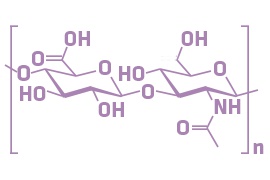
Rating: BEST
What It Does: skin-identical ingredient, moisturizer, humectant
Quick Facts:
- It is naturally in our skin and behaves like a sponge
- It can bind up to 1,000 times its own weight in water
- It is the big molecule from repeated subunits (polymer) so different molecular weight versions exist.
- High-molecular-weight HA (>500 kDa) is an excellent surface hydration, skin protectant and can act as an osmotic pump helping water-soluble activities to penetrate deeper into skin.
- Low-molecular-weight HA (< 500 kDa) can hydrate the skin deeper thought is is still a big molecule and works mainly in the epidermis (outer layer of the skin).
- Low-molecular-weight HA (Approx. 200 kDa) might also help the skin to repair itself by increasing its self-defense.
- Ultra-low-molecular-weight HA (< 50 kDa) is a controversial ingredient and might work as a pro-inflammatory signal molecule.
Description:
Component of skin tissue. Synthetic variations are used in skincare products to function as a superior skin-replenishing ingredient. Hyaluronic acid has restorative abilities and can boost skin’s moisture content, soothe, and defend against moisture loss. It is capable of holding up to 1,000 times its own weight in water, making it an optimal hydrator for all skin types.
Benefits:
Hyaluronic Acid helps reduce the visibility of fine lines and wrinkles retaining moisture to the skin, creating a plumping effect. When the skin is protected and hydrated, increased skin cell production can take place, as the skin isn't busy fighting for hydration. This leads to smoother, plumper skin cells.
